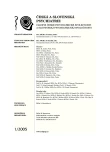The Adverse Events of Lithium Treatment, their Mechanisms and Management
Vedľajšie účinky liečby lítiom, ich mechanizmy a zvládnutie
Lítium bolo štandardnou liečbou bipolárnej poruchy za posledných 25 rokov. Je to alkalický kov s podobnými vlastnosťami ako má sodík a draslík. Vedľajšie účinky sú bežné a postihujú mnohopočetné orgánové systémy, a preto je nutné pacienta počas liečby starostlivo sledovať. Mierne gastrointestinálne ťažkosti, jemný tremor rúk a svalová slabosť sa zvyknú objaviť na začiatku liečby, ale zvyčajne vymiznú a sú dobre tolerované. Narušenie kognitívnych funkcií a váhový prírastok môžu byť problematickejšie. Iné vedľajšie účinky, ktoré môžu byť spojené s chronickou liečbou lítiom (napr. dysfunkcia obličiek a štítnej žľazy , toxické plazmatické hladiny), môžu byť závažnejšie, ale dá sa im predísť starostlivým monitorováním, alebo zvládnuť vhodnou intervenciou.
Kľúčové slová:
lítium, bipolárna porucha, alkalický kov, kognitívne funkcie, váhový prírastok.
Authors:
Ľ. Virčík; E. Rusínová
Authors‘ workplace:
Psychiatrická nemocnica, Michalovce
Published in:
Čes. a slov. Psychiat., 101, 2005, No. 1, pp. 36-39.
Category:
Comprehensive Reports
Overview
Lithium has been standard drug therapy for bipolar disorder over the last 25 years. It is an alkali methal that shares many properties with sodium and potassium. Adverse effects involving multiple organ systems are common and require careful patient monitoring throughout treatment. Mild gastrointestinal upset, fine hand tremor, and muscle weakness may occur transiently during initial therapy, but they usually subside and are generally tolerated. Cognitive dulling and weight gain may be more problematic. Other adverse events associated with chronic lithium treatment (e.g., thyroid and renal dysfunction, toxic serum levels) can be serious but are usually prevented by vigilant monitoring and appropriate intervention.
Key words:
lithium, bipolar disorder, alkali metal, cognitive dulling, weight gain.
Labels
Addictology Paediatric psychiatry PsychiatryArticle was published in
Czech and Slovak Psychiatry

2005 Issue 1
- Memantine Eases Daily Life for Patients and Caregivers
- Memantine in Dementia Therapy – Current Findings and Possible Future Applications
- Hope Awakens with Early Diagnosis of Parkinson's Disease Based on Skin Odor
- Deep stimulation of the globus pallidus improved clinical symptoms in a patient with refractory parkinsonism and genetic mutation
-
All articles in this issue
- Influence of Partner Relationships on the Course of Psychotic Disease
- The Adverse Events of Lithium Treatment, their Mechanisms and Management
- Current Opinions on Alcohol Abuse and Dependence in the Elderly
- University Graduated Clients Treated in Ward for Treatment of Addictive Disorders in Psychiatric Hospital in Brno-Černovice
- Psychosocial Stressors in Young Families from Brno and Znojmo Part I
- Evaluation of Psychopathology in Patients Suffering from Paroxysmal Supraventricular Tachycardia One Year after Radiofrequency Catheterization Ablation
- EEG Alterations during Clozapine Therapy
- NDRI Concept in the Treatment of Depression
- Czech and Slovak Psychiatry
- Journal archive
- Current issue
- About the journal
Most read in this issue
- NDRI Concept in the Treatment of Depression
- The Adverse Events of Lithium Treatment, their Mechanisms and Management
- EEG Alterations during Clozapine Therapy
- Influence of Partner Relationships on the Course of Psychotic Disease
